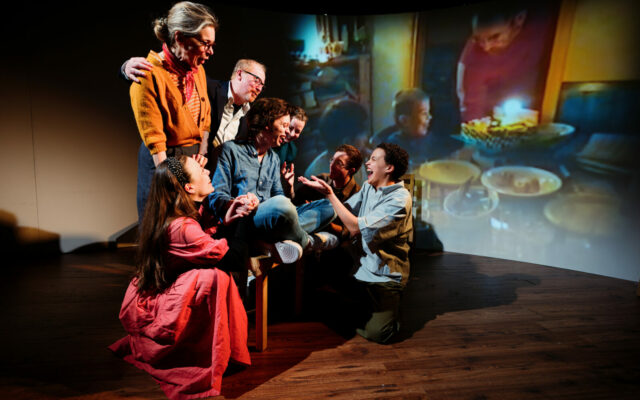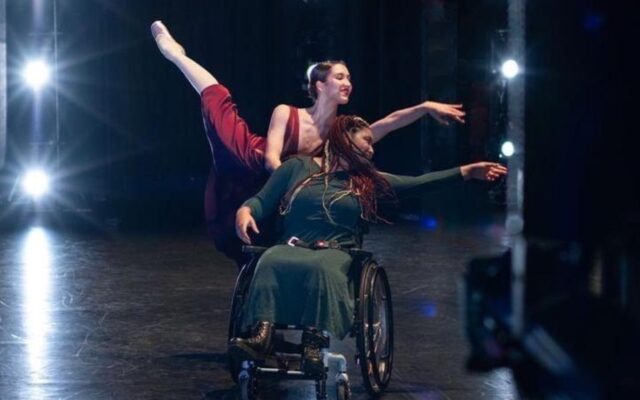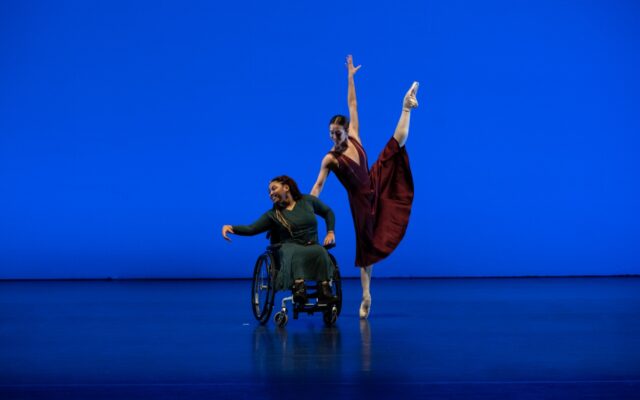Maybe like most social movements, it all started over a pint in a pub. I was the bass player in punk band Heavy Load with four other musicians, three of whom had learning disabilities.
Our sound was probably an acquired taste. We were loud, chaotic and very sweary. We often had no idea what was going to happen next in our performances, which made life really exciting for us and for our fans.
When we formed in 1997, there weren’t many bands around at the time doing what we did – and it is fair to say none were doing quite what we did.
This attracted the attention of documentary film director Jerry Rothwell, who made a movie about our peculiar world.
Before filming started, we had already made a reputation for ourselves playing all over the UK at disability arts events – where the same thing would happen. At 9pm, just before we got on stage, half the audience would leave
We never for one moment thought it was anything to do with the energy burst and torrent of swearing that we were about to unleash. No; we assumed that there must have been a fundamental flaw in the way support staff shifts had been planned, which meant they were not flexible enough to allow people to see the end of a gig or club night.
We knew we had to do something about it.
Going mainstream
Back to the pint at the start of this article. We had been invited to support another band at a local pub.
The place was rammed and we just went for it. The scene that unravelled was like something out of a movie. As we unleashed our thrash punk version of Batman, most people seemed to have their mouths hanging open – we were not pub rock and this was not what they were expecting.
However, Simon Barker, our charismatic frontman, soon won them over and, by the end of the set, he had everyone singing along and clapping. It was just incredible.
Afterwards, we had a post-gig pint to round the evening off.
This had been a massive deal for us. It was the first time we had played to a non disability arts audience and we had been quite nervous. But we stormed it and they loved us. We deserved a drink and to bask in the moment.
Michael White (our drummer) was only halfway though his pint when his support worker came over and uttered the immortal words: ‘Drink up, Michael. It’s time to go home.’ Those few words changed everything.
They took the shine off the evening but also provoked us into saying ‘Enough is enough – we have to do something about this’ and the Stay Up Late campaign was born.
The birth of the campaign is one of the stories featured in the Heavy Load film, and that was the springboard for us to do all sorts of things we had never dreamt of being possible: albums, New York, Berlin, two Glastonbury festivals, writing the theme tune for Channel 4 drama series Cast Offs and going on a road trip to play at a squat in Copenhagen. Our final gig was in Trafalgar Square in 2012 as part of the Paralympics.
Despite all these achievements, the single most important thing I think we did was starting the Stay Up Late campaign, which became a charity to continue the work we had started.
It enabled us to put in simple language a profound point about people with learning disabilities being robbed of a basic human right – the right to party.
Of course, we do not actually care what time people go to bed as long as they get to make that decision. My belief is that if people can make decisions about their social lives, then an awful lot of other things will just fall in to place because they will be living in a culture that supports them properly.
A friend to go to gigs with
The week after we played our final gig was the week I found we had been successful in getting funding to start up Gig Buddies in Brighton and Hove. One door closes and another opens.
The idea behind Gig Buddies was to create a befriending scheme where people with learning disabilities were matched with a volunteer who shared musical interests. This would enable them to foster an ongoing friendship and widen their informal support networks.
As a band, we had played at loads of club nights for people with learning disabilities and a lot of these nights are great and well run. They are brilliant places for people to meet their friends, dance, DJ and perform.
However, I believe we should be offering people with learning disabilities even more opportunities. These would include being able to choose the sort of music they want to see, to stay beyond 9.30pm (10pm if they’re lucky) and to hang out with other people who identify with whatever scene it is that they are in to. Otherwise, learning disability club nights and events can become a form of well-meant segregation.
The fundamental elements of Gig Buddies are:
People with learning disabilities lead on making choices about how they lead their lives
Being part of community life
Enjoying mainstream culture and our notion that all events can be for people with learning disabilities
And – perhaps most importantly – having people in your life who are not paid to be there.
When we started Gig Buddies, I had looked into the obstacles people with learning disabilities were facing to getting out but I had not thoroughly researched if there were similar projects around the UK. I assumed there would be and was shocked to find that we had come up with something unique.
This led to innovation charity Nesta recognising us as one of their New Radicals which in turn led to other organisations wanting to replicate our work. The first of these partners was in Sydney and the next in Edinburgh and we now have partners across the UK and others seeking to work with us.
We now support more than 100 pairs of buddies across Sussex and, because of partnerships elsewhere, we have enabled many hundreds of people with learning disabilities to become part of Gig Buddies, something way beyond what we could do ourselves as a small charity.
Punks defy ‘drink up’
Our other main work is to continue our campaigning, embracing that original moment of defiance and activism prompted by Michael White being told to drink up and being true to our roots as punks. I do not think his support worker was a bad person but was working in a poor culture that had institutionalised their way of thinking and working.
In March 2019, we decided to hold our first (un)Ordinary Conference in London. All of the speakers were people with learning disabilities and/or autism and the majority of the audience were people who worked in social care.
The speakers talked about three main issues – jobs, relationships and community – and included people we knew had positive stories to tell about these topics. They had great support and were living what you might call an ordinary life.
The response to the conference was phenomenal and the prevailing question was: ‘Why aren’t there more events like this?’ It’s a good question – there should be. We need a lot more opportunities for people with learning disabilities to tell their stories and share their dreams and for those of us working in the sector to actively listen and to act.
We also used the conference to launch our Manifesto for an Ordinary Life, which has eight themes that people with learning disabilities have consistently told us they want in their lives:
My right! Living where I choose
My right! Making my own friends
My right! #NoBedtimes
My right! Making my own decisions
My right! Loving and being loved
My right! Being valued for being me
My right! A paid job
My right! People who are happy to support me and who I have chosen to be in my life
I think it is weird that this looks so radical. Wouldn’t most people want these rights? As someone without a learning disability, I take a lot of them for granted. So the fight for the right to party is also a fight for some basic human rights.
Sociable activism
We have ambitious plans and have been assembling a network of Stay Up Late ambassadors, who are people with learning disabilities around the country we are supporting to be activists to make change.
An active group in Scotland is making all sorts of great things happen and we want to support more groups like this to start up.
We also want to hear from support staff who are making great things happen. We want to share positive stories of how great support is enabling people to lead the lives they truly want.
Finally – perhaps this is our most ambitious plan – we want to work with commissioners on how they can take a ‘no bedtimes’ approach. How can they make sure support providers uphold these basic human rights?
We are also seeking to run Gig Buddies in more parts of the country.
Do join us on our fight for the right to party and to end bedtimes for adults with learning disabilities.
www.stayuplate.org
www.gigbuddies.org.uk
Paul Richards is director of Stay Up Late. paul@stayuplate.org





